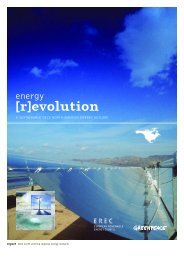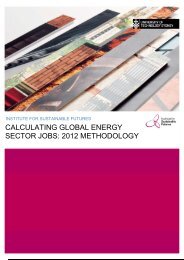download the mexico energy revolution scenario
download the mexico energy revolution scenario
download the mexico energy revolution scenario
Create successful ePaper yourself
Turn your PDF publications into a flip-book with our unique Google optimized e-Paper software.
WORLD ENERGY [R]EVOLUTION<br />
A SUSTAINABLE ENERGY OUTLOOK<br />
9<br />
climate & <strong>energy</strong> policy | TARGETS AND ACTION<br />
If <strong>the</strong> Energy [R]evolution is to happen, <strong>the</strong>n governments around<br />
<strong>the</strong> world need to play a major part. Their contribution will include<br />
regulating <strong>the</strong> <strong>energy</strong> market, both on <strong>the</strong> supply and demand side,<br />
educating everyone from consumers to industrialists, and<br />
stimulating <strong>the</strong> market for renewable <strong>energy</strong> and <strong>energy</strong> efficiency<br />
by a range of economic mechanisms. They can also build on <strong>the</strong><br />
successful policies already adopted by o<strong>the</strong>r countries.<br />
To start with <strong>the</strong>y need to agree on fur<strong>the</strong>r binding emission<br />
reduction commitments in <strong>the</strong> second phase of <strong>the</strong> Kyoto Protocol.<br />
Only by setting stringent greenhouse gas emission reduction targets<br />
will <strong>the</strong> cost of carbon become sufficiently high to properly reflect<br />
its impact on society. This will in turn stimulate investments in<br />
renewable <strong>energy</strong>. Through massive funding for mitigation and<br />
technology cooperation, industrialised countries will also stimulate<br />
<strong>the</strong> development of renewable <strong>energy</strong> and <strong>energy</strong> efficiency in<br />
developing countries.<br />
Alongside <strong>the</strong>se measures specific support for <strong>the</strong> introduction of<br />
feed-in tariffs in <strong>the</strong> developing world - <strong>the</strong> extra costs of which<br />
could be funded by industrialised countries - could create similar<br />
incentives to those in countries like Germany and Spain, where <strong>the</strong><br />
growth of renewable <strong>energy</strong> has boomed. Energy efficiency<br />
measures should be more strongly supported through <strong>the</strong> Kyoto<br />
process and its financial mechanisms.<br />
Carbon markets can also play a distinctive role in making <strong>the</strong><br />
Energy [R]evolution happen, although <strong>the</strong> functioning of <strong>the</strong> carbon<br />
market needs a thorough revision in order to ensure that <strong>the</strong> price<br />
of carbon is sufficiently high to reflect its real cost. Only <strong>the</strong>n can<br />
we create a level playing field for renewable <strong>energy</strong> and be able to<br />
calculate <strong>the</strong> economic benefits of <strong>energy</strong> efficiency.<br />
Industrialised countries should ensure that all financial flows to<br />
<strong>energy</strong> projects in developing countries are targeted towards<br />
renewable <strong>energy</strong> and <strong>energy</strong> efficiency. All financial assistance,<br />
whe<strong>the</strong>r through grants, loans or trade guarantees, directed towards<br />
supporting fossil fuel and nuclear power production, should be<br />
phased out in <strong>the</strong> next two to five years. International financial<br />
institutions, export credit agencies and development agencies should<br />
provide <strong>the</strong> required finance and infrastructure to create systems<br />
and networks to deliver <strong>the</strong> seed capital, institutional support and<br />
capacity to facilitate <strong>the</strong> implementation of <strong>the</strong> Energy [R]evolution<br />
in developing countries.<br />
While any <strong>energy</strong> policy needs to be adapted to <strong>the</strong> local situation,<br />
we are proposing <strong>the</strong> following policies to encourage <strong>the</strong> Energy<br />
[R]evolution that all countries should adopt.<br />
1. climate policy<br />
Policies to limit <strong>the</strong> effects of climate change and move towards a<br />
renewable <strong>energy</strong> future must be based on penalising <strong>energy</strong> sources<br />
that contribute to global pollution.<br />
Action: Phase out subsidies for fossil fuel and nuclear power<br />
production and inefficient <strong>energy</strong> use<br />
The United Nations Environment Programme (UNEP) estimates<br />
(August 2008) <strong>the</strong> annual bill for worldwide <strong>energy</strong> subsidies at<br />
about $300 billion, or 0.7% of global GDP. 70 Approximately 80%<br />
of this is spent on funding fossil fuels and more than 10% to<br />
support nuclear <strong>energy</strong>. The lion’s share is used to artificially lower<br />
<strong>the</strong> real price of fossil fuels. Subsidies (including loan guarantees)<br />
make <strong>energy</strong> efficiency less attractive, keep renewable <strong>energy</strong><br />
out of <strong>the</strong> market place and prop up non-competitive and<br />
inefficient technologies.<br />
Eliminating direct and indirect subsidies to fossil fuels and nuclear<br />
power would help move us towards a level playing field across <strong>the</strong><br />
<strong>energy</strong> sector. Scrapping <strong>the</strong>se payments would, according to UNEP,<br />
reduce greenhouse gas emissions by as much as 6% a year, while<br />
contributing 0.1% to global GDP. Many of <strong>the</strong>se seemingly well<br />
intentioned subsidies rarely make economic sense anyway, and<br />
hardly ever address poverty, <strong>the</strong>reby challenging <strong>the</strong> widely held<br />
view that such subsidies assist <strong>the</strong> poor.<br />
Instead, governments should use subsidies to stimulate investment<br />
in <strong>energy</strong>-saving measures and <strong>the</strong> deployment of renewable <strong>energy</strong><br />
by reducing <strong>the</strong>ir investment costs. Such support could include<br />
grants, favourable loans and fiscal incentives, such as reduced taxes<br />
on <strong>energy</strong> efficient equipment, accelerated depreciation, tax credits<br />
and tax deductions.<br />
The G-20 countries, meeting in Philadelphia in September 2009,<br />
called for world leaders to eliminate fossil fuel subsidies, but<br />
hardly any progress has been made since <strong>the</strong>n towards<br />
implementing <strong>the</strong> resolution.<br />
Action: Introduce <strong>the</strong> “polluter pays” principle<br />
A substantial indirect form of subsidy comes from <strong>the</strong> fact that <strong>the</strong><br />
<strong>energy</strong> market does not incorporate <strong>the</strong> external, societal costs of <strong>the</strong><br />
use of fossil fuels and nuclear power. Pricing structures in <strong>the</strong> <strong>energy</strong><br />
markets should reflect <strong>the</strong> full costs to society of producing <strong>energy</strong>.<br />
This requires that governments apply a ‘polluter pays’ system that<br />
charges <strong>the</strong> emitters accordingly, or applies suitable compensation<br />
to non-emitters. Adoption of polluter pays taxation to electricity<br />
sources, or equivalent compensation to renewable <strong>energy</strong> sources,<br />
and exclusion of renewables from environment-related <strong>energy</strong><br />
taxation, is essential to achieve fairer competition in <strong>the</strong> world’s<br />
electricity markets.<br />
references<br />
70 “REFORMING ENERGY SUBSIDIES: OPPORTUNITIES TO CONTRIBUTE TO THE CLIMATE<br />
CHANGE AGENDA”, UNEP, 2008.<br />
100



![Energy [R]evolution - European Commission](https://img.yumpu.com/49109324/1/184x260/energy-revolution-european-commission.jpg?quality=85)


![5905 gp [eu rev]csfr4.qxd - Energy [R]evolution](https://img.yumpu.com/42305023/1/184x260/5905-gp-eu-revcsfr4qxd-energy-revolution.jpg?quality=85)


![5905 gp [eu rev]csfr4.qxd - Energy [R]evolution](https://img.yumpu.com/28729264/1/184x260/5905-gp-eu-revcsfr4qxd-energy-revolution.jpg?quality=85)